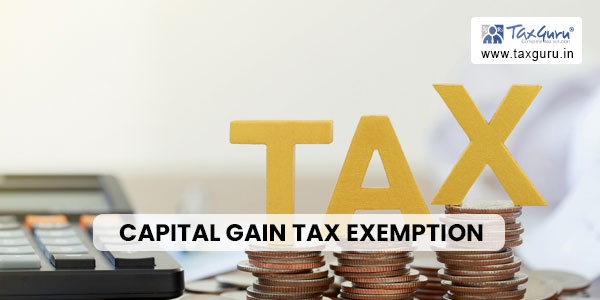Section 54 of the Income Tax Act offers taxpayers the opportunity to claim a deduction from capital gains income tax when selling a property if they purchase or construct another residential property within a specified timeframe. However, the determination of the acquisition date for the new property can be a complex issue, with various dates such as advance payment, allotment letter, agreement, construction completion, and possession coming into play. In this article, we will explore the significance of the acquisition date in the context of capital gain tax exemption under Section 54. We will delve into key illustrations and judicial decisions to shed light on this critical aspect.
1. Section 54 of the Income Tax Act provides that a taxpayer is eligible for deduction from capital gains income tax on the sale of property if he purchases or constructs another residential property within two / three years.
1.1 There are various dates associated with the acquisition of a new property by an individual. It may be the date of advance payment, date of allotment letter, date of agreement, date of completion of construction & date of possession, etc.
1.2 The question here is which date is to be considered as the date of acquisition for the purchase of property for deduction under section 54. Let us try to understand this with the help of Illustrations and judicial pronouncements.
2. Period of holding of a flat reckoned from the date of allotment letter
2.1 Illustration Mr. Sanjay booked a flat in a multi-story building and received an allotment letter dated 22-1-2005 from the builder. He paid token money of Rs 1 lakh on the date of booking and the balance payment was made in installments gradually. The sale agreement was executed between him and the builder on 27-2-2009 after payment of full consideration.
2.1.1 Thereafter, Mr. Sanjay sold said flat on 5-3-2009 and invested sale consideration under the Capital Gain Scheme with the Bank.
2.1.2 Mr. Sanjay wishes to know whether the period of holding of a flat is reckoned from the date of the allotment letter or the date of execution of the agreement. Accordingly, Capital Gain on sale of property is to be considered as short-term capital gain or long-term capital gain.
2.2 Judicial Pronouncement: – It was held by the Indore Tribunal in the case of Sanjay Kumath V ACIT (2014) that the period of holding of a flat reckoned from the date of allotment letter as it extinguished the right of the builder in the flat. Further, the Board vide Circular No. 672 extended the facility of exemption under sections 54 & 54F in respect of the allotment of flat/house.
2.2.1 In the Illustration above, Mr. Sanjay had acquired all rights in said flat on the date of allotment thus, the holding period being more than 36 months, exemption under section 54F was admissible to him.

Also Read: Capital Gain Tax Exemption Under Section 54F Landmark Judgements
3. Capital Gain Exemption cannot be disallowed only because construction is not completed within the prescribed period.
3.1 Illustration: Mr. Swami sold a plot of land on 14.05.2015 and earned LTCG, which was invested in the construction of a residential house, and accordingly deduction under section 54F was claimed However, the construction timeline had not been met till 13.05.2018 (within three years of the transfer of property)
3.1.1 Mr. Swami had complied with the provisions of section 54F and hence was entitled to the benefit of exemption claimed.
3.2 Judicial Pronouncement: Hon’ble High Court of Madhya Pradesh, in the case of Smt. Shashi Varma v. CIT held that there was no merit in the plea of the authorities in denying the exemption under section 54F on the ground that the construction of the house had not been completed. The requirement of sections 54 and 54F is for the assessee to have either purchased a residential house being a new asset within the stipulated period or construct a residential house within three years from the date of transfer. The section does not prescribe the completion of the construction of the residential house and the thrust is on the investment of the net consideration received on the sale of the original asset and the start of construction of a new residential house. In view thereof, where the assessee had invested the consideration received on the sale of the original asset in the purchase of the plot of land and started construction, though not completed, the assessee had complied with the provisions of section 54F and hence was entitled to the benefit of exemption claimed.
3.2.1 It was further stated that in the modern days, it is not easy to construct a house within the time limit of two years, and under Government schemes, construction takes years and years. Therefore, confining to a year for construction and handing over possession thereof is impossible and unworkable under section 54. If substantial investment is made in the construction of the house, then it should be deemed that sufficient steps have been taken and this satisfies the requirements of section 54.
3.2.2 It was held by the Delhi Tribunal in the case of Subramanian Swaminathan v ACIT(IT) (2023) that the assessee has entered into an agreement with a builder and invested the capital gain for the purchase of a residential unit, he is entitled to deduction u/s. 54 irrespective of the fact that the builder has not completed the construction or has not yet handed over the flat.
Also Read: Capital Gain Tax Exemption – Construction of Property
4. Date of Agreement or Date of Registration
4.1 Illustration: Mr. Sanjeev decided to purchase a house and with that intention, he had agreed to purchase the house with Mr. Anuj on 27 December 2002 for a consideration of Rs. 1.32 crores. The purchase deed was registered on 24th September 2004.
4.1.1 In case, he wishes to sell the property in Sep 2023, what will be considered as the date of acquisition of the property?
4.1.2 The date of acquisition of the house will be the date of agreement i.e., 27 December 2002, and not the date of registration.
4.2 Judicial Pronouncement: It was held by the Hon’ble Supreme Court of India in the case of Sanjeev Lal v CIT (2014) that the agreement to purchase is to be considered as a date on which the property i.e., the residential house had been acquired (transferred).
4.2.1 It is stated that by looking at the provisions of Section 2(47) of the Act, which defines the word “transfer” in relation to a capital asset, one can say that if a right in the property is extinguished by execution of an agreement to sell, the capital asset can be deemed to have been transferred. One can very well interpret the provisions of Section 54 read with Section 2(47) of the Act, i.e., the definition of “transfer”, which would enable the appellants to get the benefit under Section 54 of the Act by considering the date of agreement as the date of acquisition(transfer).
Also Read: Capital Gain Tax Exemption on New Home Purchase in Relative’s Name
5. Terms of Agreement Deed is crucial to decide the date of transfer and capital Gain Exemption:
5.1 Illustration: Mr. Rajiv earned long-term capital gains on the sale of shares on 17.08.2011. He had entered into a buyer agreement with the builder on 29-9-2009.
5.1.1 The Deed of Agreement between Mr. Rajiv & the builder had following clause: –
Clause 12 of the agreement deed: – Nothing contained in this Agreement shall be construed to confer upon the Purchaser any right whatsoever into or over the said property or the said new building or any part thereof including the said premises on execution of this agreement. It is agreed by and between the parties that conferment of title in respect of the said premises shall take place in favor of the Purchasers only on the Purchasers making full payment of consideration to the Developers and complying with the terms and conditions of this Agreement
5.1.2 The full consideration has been paid by Mr. Rajiv on 17.09.2010. Thereafter, actual possession of the flat was delivered to him on 17.09.2010 i.e., within one year prior to the date of transfer of capital asset.
5.1.3. Mr. Rajiv is entitled to claim exemption under section 54F.
5.2 Judicial Pronouncement: It was held by the Delhi Tribunal in the case ofRajiv Madhok v ACIT (2020) that the relevant date is when the petitioner paid the full consideration amount on the flat becoming ready for occupation and obtained possession of the flat. The Tribunal has looked at the clause of the agreement deed and concluded that the purchase was substantially affected when the agreement of purchase was carried out by payment of full consideration and handing over of possession of the flat.
Also Read: Capital Gain Tax Exemption – Sale of Inherited Property
6. The date of advance payment is not a date of transfer of property
6.1 Illustration: Ms. Shahina paid Rs 50 Lakh as an advance towards the purchase of property on 14 .02. 2006. The sale deed was executed on 04.09.2006. The acquisition date for the said property is 04.09.2006 and not the date of advance payment i.e.,14.02.2006
6.2 Judicial Pronouncement: It was held by the Hon’ble Delhi High Court, in the case of CIT v Delhi Apartment Pvt. Ltd (2013) that mere payment of advance towards the purchase of a property cannot be considered a transfer (acquisition) of the property.
6.2.1 Two conditions are to be fulfilled in order to bring a transaction within the expression “Transfer”, under section 2(47) & 53A of the Transfer of Property Act, i.e. (a) execution of a written agreement, and (b) handing over of possession of the property.
6.2.2 The execution of written agreement and handing over of possession have to be cumulatively satisfied in order to bring the case within the ambit of section 2(47)(v) of the Act.
Also Read: Capital Gain Tax Exemption – Date of Purchase or Construction of New Property
7. Conclusion: Sections 54 & 54F of the Income Tax Act have always been matters of litigation between the assessee and the department on some controversial issues. Many issues are well-settled by judicial pronouncements but there are some issues on which conflicting decisions are available by courts/tribunals, and judicial authorities.
Every case is unique and has its specific facts and circumstances. It is highly recommended that an individual take appropriate decision considering the specific factors of the issue involved.
******
Disclaimer: The article is for education purposes only.
The author can be approached at [email protected]






my mother 81 years old has a house in her name and it is a share to me. This property is going to be sold. And I am going to buy one house to be registered in my spouse name. please advise implementation of capital gain to my mother.
I am purchasing a flat from a builder by given token amount plus 48.5 percent construction completed.
I plan to sell my old home to gain the LTCG.
Agreement of sale to be entered on 16 th Oct23 and property possession in Dec 26.
pl suggest can I get Capital gain exemption on my sale of old flat.
There was lot of confusion in my mind regarding the rightful Date of Acquistion of a flat from a Builder. To quite a large extent my queries have been answered by this article of yours.
Thank you.